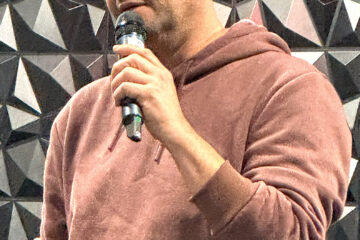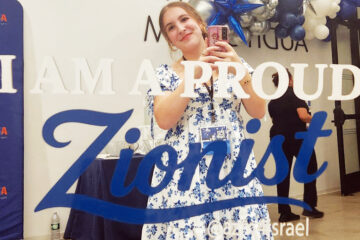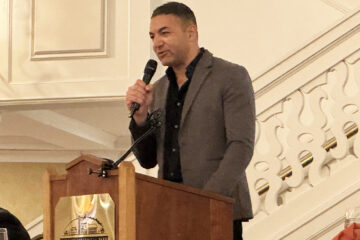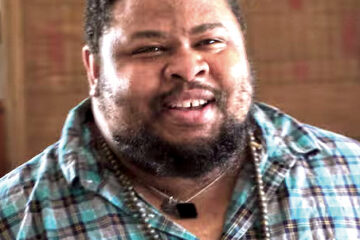Critical thinking, empathy hallmarks of WSU Boonshoft med school’s Physicians & Holocaust course
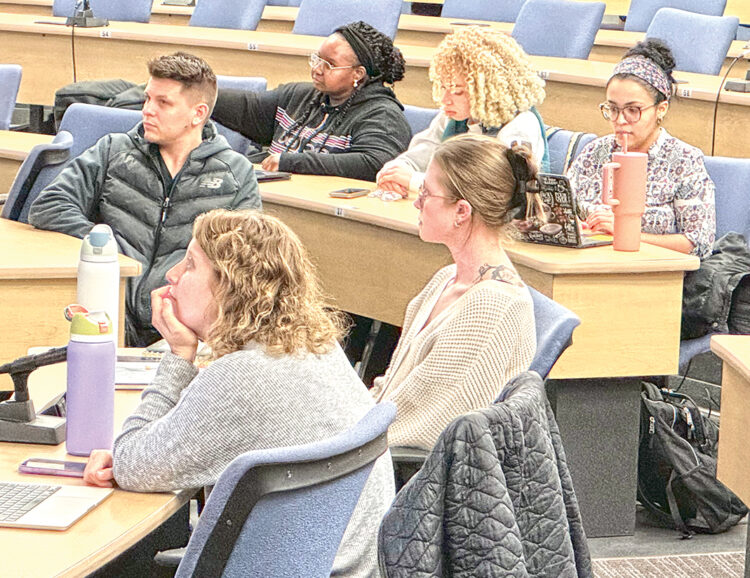
‘This class is about action’
By Marshall Weiss, The Dayton Jewish Observer
Fourth-year medical student Ashley Hughes from Shaker Heights says she’ll graduate Wright State University’s Boonshoft School of Medicine April 28 with a strong background in patient care.
“You see patients from different cultures, backgrounds, different types of situations,” she says. Hughes wanted to expand her ability to relate to her patients so she can give them the best care possible. That led her to enroll in the medical school’s Physicians and the Holocaust elective with Dr. David B. Shuster.
“I’m learning things about myself that I didn’t know, because he’s asking me to look deeply into my philosophy about life,” Hughes says.
A clinical assistant professor of orthopaedic surgery, Shuster has now taught the class — open only to fourth-year students — for a decade.
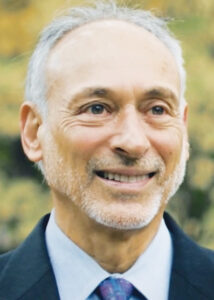
“This class is about action. And what you do is action,” Shuster, the son of a Holocaust survivor, tells his class. Fourteen fourth-year students are enrolled in the yearlong course.
“I want them to think,” he tells The Observer. “I want them to think critically. I want them to look into their own hearts, synthesize their thoughts, and be able to express them, whatever they are.”
Amanda Peck of Cincinnati says she’s learned about respect and humility in the class.
“And how gray the world is. Things aren’t necessarily as straightforward as they seem on the outside,” she says.
Peck went on Birthright Israel last year. It was in Israel where she says she truly comprehended that antisemitism has exploded in the United States. “When I was born in 1997, there were about 1,000 antisemitic hate crimes a year,” she says. “Just over my lifespan of 26 years, it’s more than increased by threefold.”
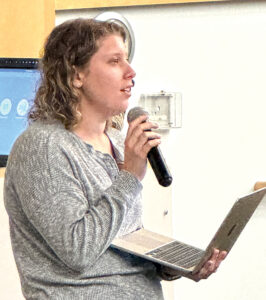
She tells The Observer that at the beginning of each Physicians and the Holocaust class, Shuster poses three or four open-ended questions for the students to consider and discuss.
A question could be: What is a person? How do you tell the difference between right and wrong? Does the concept of right versus wrong make any difference in the actions humanity chooses? Are there lives which are not worth living? Are their lives which are too expensive? In the context of your worldview, how could the Holocaust happen?
The class visits Montgomery County Stillwater Center, a residential facility for people with severe disabilities. They learn about the racist pseudo-science of eugenics. They visit the Veterans Memorial Museum in Germantown and Prejudice and Memory: A Holocaust Exhibit on permanent display at the National Museum of the U.S. Air Force.
One of Peck’s contributions to this class is a presentation on the history of antisemitism.
She says the course has provided her with perspective, especially with patients. “You don’t know their backgrounds or where they come from.”
The goal of Physicians and the Holocaust is for students to take meaningful action as a result of participating in the course.
To that end, Shuster requires each student to create and implement their own Holocaust and Humanity Project. “There’s thought and there’s talk,” he says. “But actions speak.”
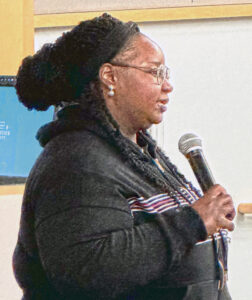
Each student designs a project based on their own passions and talents. The result is a tangible action in the world.
The Boonshoft School of Medicine began offering the Physicians and the Holocaust course in 2008. It was originally led by medical ethics professor and physician Dr. Ashley Fernandes and the late Rhoda Mahran. Dayton Holocaust Education Committee Chair Renate Frydman has also been involved since the beginning.
When Fernandes moved on to The Ohio State University College of Medicine and Nationwide Children’s Hospital in 2014, Shuster took over the course.
Some of the Holocaust and Humanity Projects Shuster recalls over his decade teaching the course include a medical student who was also a violinist playing the violin at the Community Yom Hashoah Observance. Another student, originally from Ukraine, sold her homemade pirozhki and donated the proceeds to a charity.
He says Dr. Sara Tisherman’s project stands out. “She and other students in the class put together a Passover Seder for all the students. (Survivor) Sam Heider was there. Renate was there. If I had to pick one thing, that would be it. Because the students participated.”
Tisherman has returned to the Boonshoft School of Medicine, as an assistant professor in the Department of Family Medicine. And in June, with the start of the next academic year, Tisherman will co-direct the course with Shuster.
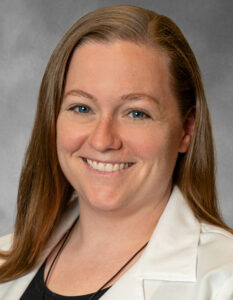
“The course improved my ability to have productive conversations about difficult topics without transitioning from conversation to argument,” she says. “I became more comfortable conveying my opinions to peers and more comfortable with public speaking. All of these skills have helped me in interviews, work, and personal situations since the course.”
Local Holocaust survivors have met with the students and shared their stories since the beginning of the course.
This year, students met Felix Garfunkel, Henry Guggenheirmer, Ira Segalewitz, former Daytonian Felix Weil virtually from Chicago, Renate Frydman, and Bob Kahn, who at the time was 99.
“It took a lot for him to come to our class,” Hughes says. “He was definitely a warrior to come and speak to us and make that trip. His presence is powerful. He came in, he stood up to speak with us. He didn’t want to sit down.”
In February, Hughes led a class discussion about the 1946 book Man’s Search for Meaning by Viktor Frankl, required reading for the students.
“Almost anybody that I talk to from other medical schools doesn’t have a class like this,” Hughes says.
On Match Day, March 15, she learned that she’ll be a resident in anesthesiology at Oregon Health and Science University in Portland.
“Dr. Shuster really has a vision that most physicians don’t have,” Hughes says when asked what she’ll take with her from the course. “A vision to empower us to be open-minded, to be creative, to dive deeply into our own biases and judgements and thoughts and be able to apply them to our practice of medicine, the art of medicine. It goes beyond the scientific aspect of medicine. He’s saying, go out into this world and be yourself and don’t be afraid to do something for others that may be nontraditional.”
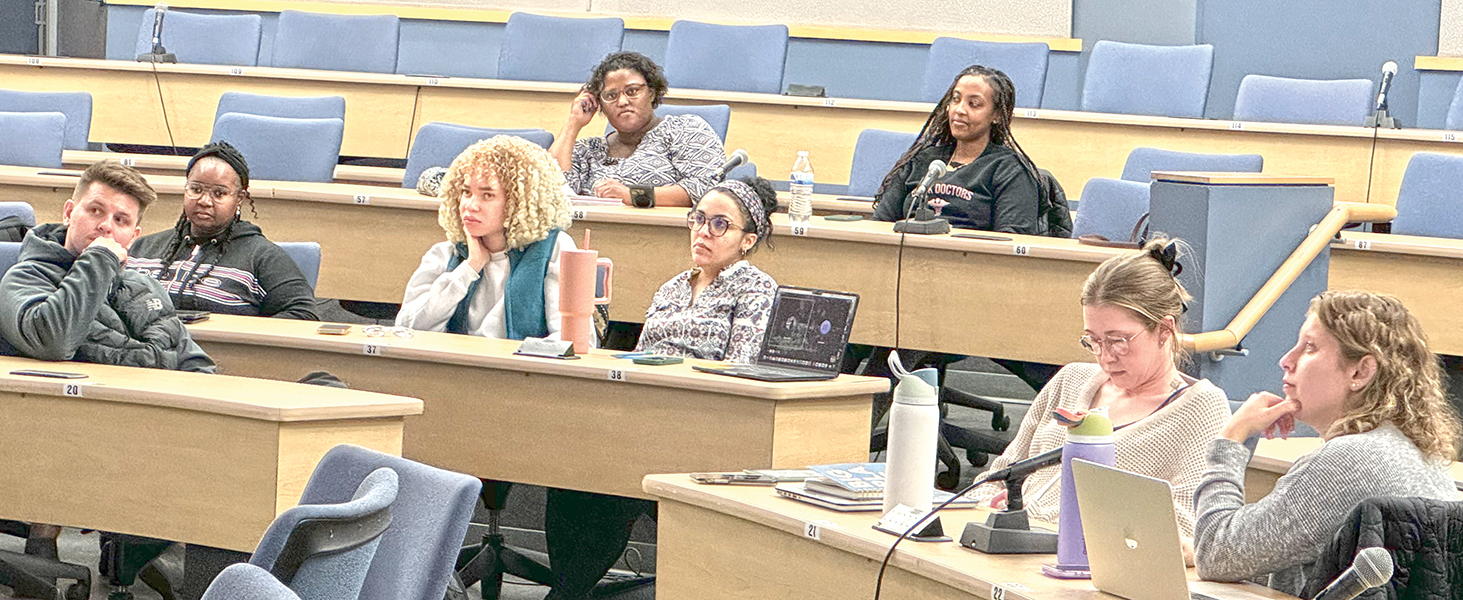
Another goal of the course, Shuster adds, is to cultivate Holocaust speakers beyond survivors: professors, other physicians, who may never have given a presentation about the Holocaust.
“For instance, we had Dr. Marvin Miller, who’s a geneticist at Children’s, talk about eugenics. Pam Garverick, who’s a Ph.D. professor of psychology. I wanted it to be their peers, their professors.”
Peck will return to Cincinnati for her neurology residency at University of Cincinnati Medical Center.
“Hearing everyone’s differences of opinions in this class on how they answered different questions — and learning about everyone’s stories and emotional traumas — is something I will really take with me as a doctor,” Peck says.
For Shuster’s work with the class, the Boonshoft School of Medicine honored him with its 2017 Voluntary Faculty Award for teaching medical students.
In 2020, he received the Montgomery County Board of Developmental Disabilities Services’ Erin Ritchey Memorial Educator Award, given to those whose personal efforts have contributed significantly to improving the quality of life for people with developmental disabilities.
“I’m honored to be a part of it,” Shuster says of Physicians and the Holocaust. “With each class, the students inspire me, and I’m just blown away by their actions and their thoughtfulness. When they’re there, at a time that is very stressful for them — they’re all over the country, they’re just trying to get a residency — they put their hearts into this.”
To read the complete April 2024 Dayton Jewish Observer, click here.


